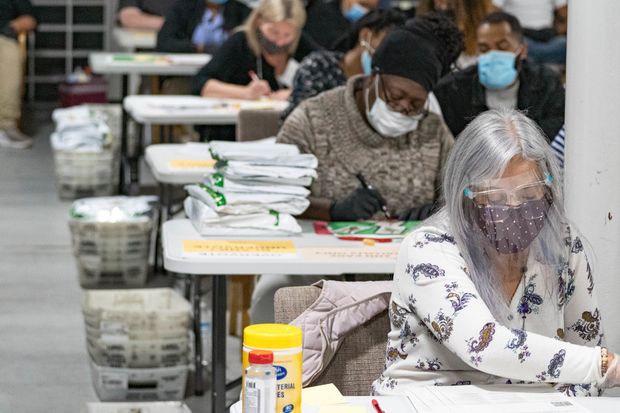
Election workers in Gwinnett County, Georgia, handle ballots as part of the recount for the 2020 presidential election.
Getty Images
A recount of the Nov. 3 presidential election votes in Georgia only slightly reduced the lead of Joe Biden over President Donald Trump, according to the Associated Press, and state authorities were readying to declare official results.
- The AP notes that the operation in Georgia wasn’t an official recount under state law but a “ hand-tallied audit of ballots cast” ordered by Georgia Secretary of State Brad Raffensperger, a Republican, to check that machines counted ballots accurately.
- The Trump campaign will have two days to request a formal machine recount, once the state of Georgia has proclaimed Biden the winner, which should happen on Friday.
- Trump invited Michigan lawmakers to the White House on Friday to try to convince them to help him overturn the result in the state.
- Officials of the sitting president’s campaign have indicated that they are pushing Republican-controlled state legislatures to appoint pro-Trump electors who would swing the Electoral College, due to meet on Dec. 14 to formally elect the president.
- Pennsylvania and Michigan, two swing states that also went for Biden, are expected to certify their results on Monday. Nevada must certify the vote by Tuesday.
- Trump will “go down in history as being one of the most irresponsible presidents,” Biden said on Thursday.
- U.S. Treasury Secretary Steven Mnuchin sent a letter to Federal Reserve Chair Jerome Powell on Thursday indicating he would not renew several emergency lending programs agreed together with the central bank to counter the consequences of the COVID-19 pandemic. The programs will be left to expire on Dec. 31.
The outlook: The legal venues for the Trump campaign to overturn the election results are shrinking by the day. And it will become near-impossible for the outgoing president to contest the vote once all the states have formally certified their results.
Failing to change the course of the election, the Trump administration still has many ways to make life difficult for the president-elect and his future cabinet. Mnuchin’s decision not to renew several emergency Federal Reserve lending programs, met with an unusual public expression of disappointment by the Federal Reserve, didn’t only rattle the markets and Powell.
It also means that the lending programs cannot resume before February at the earliest, after the Jan. 20 Biden inauguration. And the “still-strained and vulnerable [U.S.] economy,” to quote the Fed, will have to do without them as the COVID-19 pandemic still rages.
Opinion: Boris Johnson announces big boost in military spending. Now he must find the money











